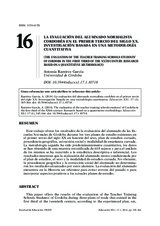Mostrar el registro sencillo del ítem
La evaluación del alumnado normalista cordobés en el primer tercio del siglo XX. Investigación basada en una metodología cuantitativa
| dc.contributor.author | Ramírez García, Antonia | |
| dc.date.accessioned | 2020-03-21T19:23:21Z | |
| dc.date.available | 2020-03-21T19:23:21Z | |
| dc.date.issued | 2014 | |
| dc.identifier.uri | http://hdl.handle.net/10396/19796 | |
| dc.description.abstract | Este trabajo ofrece los resultados de la evaluación del alumnado de las Escuelas Normales de Córdoba durante los tres planes de estudio existentes en el primer tercio del siglo XX en función del sexo, plan de estudios cursado, procedencia geográfica, extracción social y modalidad de enseñanza cursada. La metodología seguida ha sido predominantemente cuantitativa, los datos se han obtenido de una muestra estratificada de 618 sujetos y para el análisis de los mismos se ha recurrido a la estadística descriptiva e inferencial. Los resultados muestran que la evaluación del alumnado estuvo condicionada por el plan de estudios, el sexo y la modalidad de estudios cursada. No obstante, la procedencia geográfica y la extracción social del alumnado no determinaron los resultados alcanzados por estos alumnos. La evaluación del alumnado encuentra en la Historia un referente para evitar errores del pasado o para incorporar aspectos positivos a los actuales planes de estudio. | es_ES |
| dc.description.abstract | This paper offers the results of the evaluation of the Teacher Training Schools Students’ of Cordoba during three plans of study that existed in the first third of the twentieth century, according to the experienced plan, sex, geographical origin, social extraction and type of studies. The methodology has been quantitative, the information has been obtained of a stratified sample of 618 subjects and for the analysis of the same ones has been used the descriptive and inferencial statistics. The results show that the evaluation of the students was determined by the curriculum, the sex and the type of studies. However, the geographical origin and the social extraction of the students didn’t determine the results reached by these students. The evaluation of the students finds in History the regarding one to avoid errors of the past or to incorporate positive aspects into current plans of study. | es_ES |
| dc.format.mimetype | application/pdf | es_ES |
| dc.language.iso | spa | es_ES |
| dc.publisher | Universidad Nacional de Educación a Distancia. Facultad de Educación | es_ES |
| dc.rights | https://creativecommons.org/licenses/by-nc-nd/4.0/ | es_ES |
| dc.source | Educación XX1, 17(1), 345-366 (2014) | es_ES |
| dc.subject | Historia de la educación | es_ES |
| dc.subject | Rendimiento académico | es_ES |
| dc.subject | Evaluación | es_ES |
| dc.subject | Escuelas Normales | es_ES |
| dc.subject | Estudios de magisterio | es_ES |
| dc.subject | History of education | es_ES |
| dc.subject | Academic achievement | es_ES |
| dc.subject | Evaluation | es_ES |
| dc.subject | Teacher training schools | es_ES |
| dc.subject | Teacher training | es_ES |
| dc.title | La evaluación del alumnado normalista cordobés en el primer tercio del siglo XX. Investigación basada en una metodología cuantitativa | es_ES |
| dc.title.alternative | The evaluation of the teacher training schools students’ of Cordoba in the first third of the XXth century. Research based on a quantitative methodology | es_ES |
| dc.type | info:eu-repo/semantics/article | es_ES |
| dc.relation.publisherversion | https://doi.org/10.5944/educxx1.17.1.10718 | es_ES |
| dc.rights.accessRights | info:eu-repo/semantics/openAccess | es_ES |

